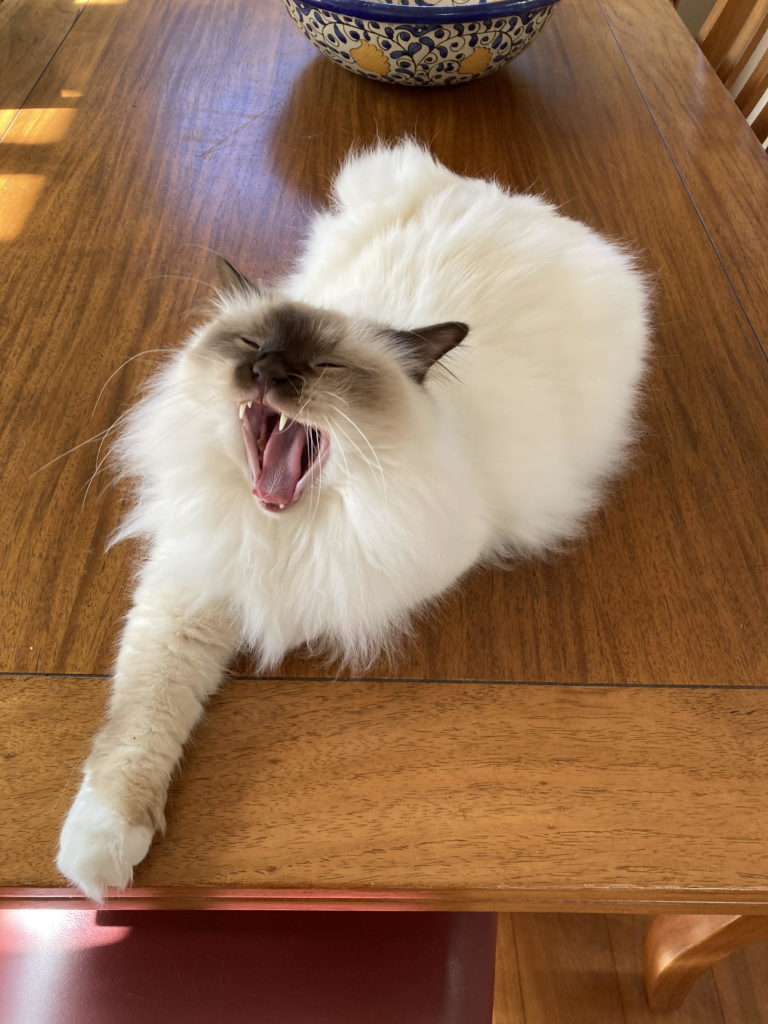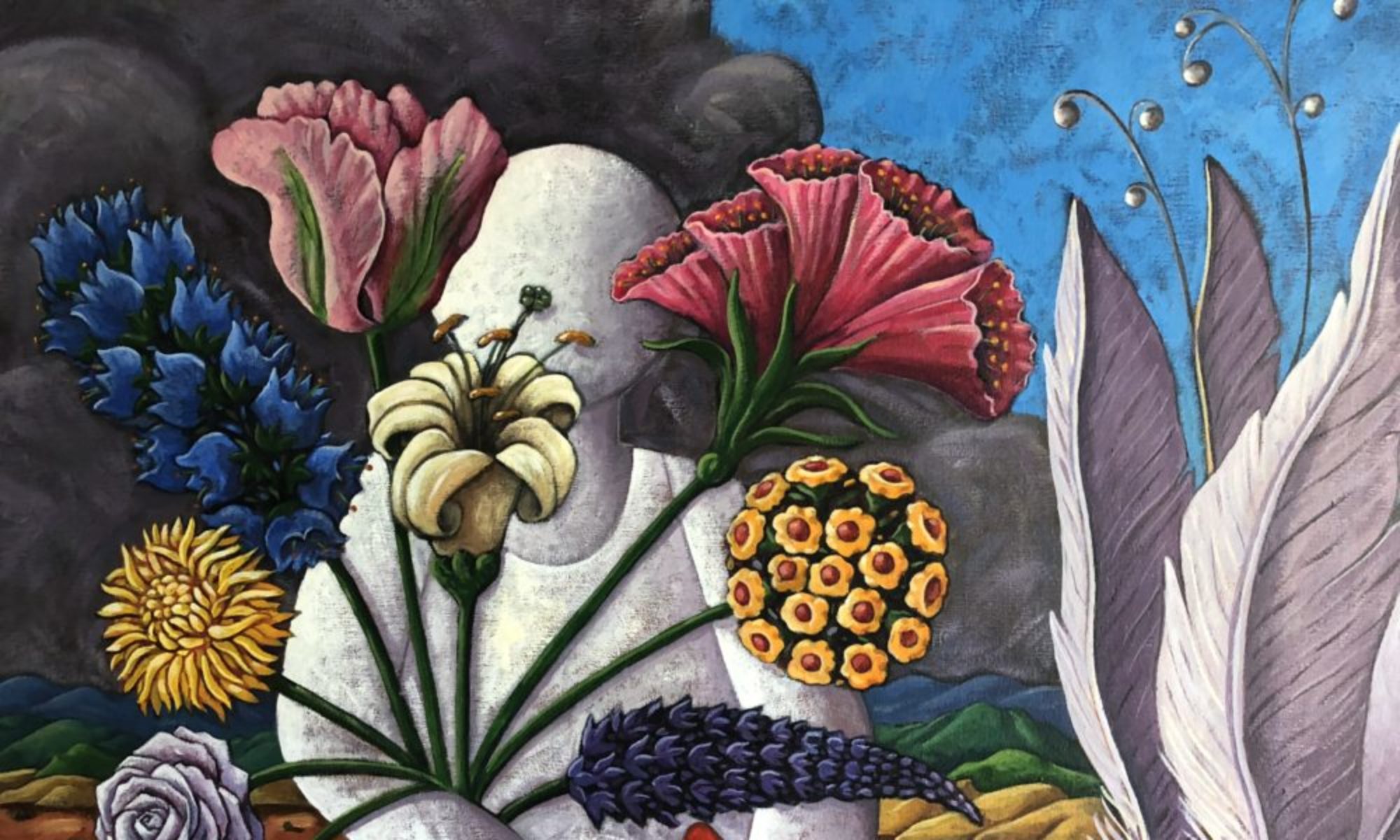As far as the writer and philosopher John Berger is concerned, animals are household gods. How could any pet lover disagree?
I wrote this reflection on the misgivings and metaphysics of pedigree pet ownership after it dawned on me that I was indeed our cat’s humble servant.
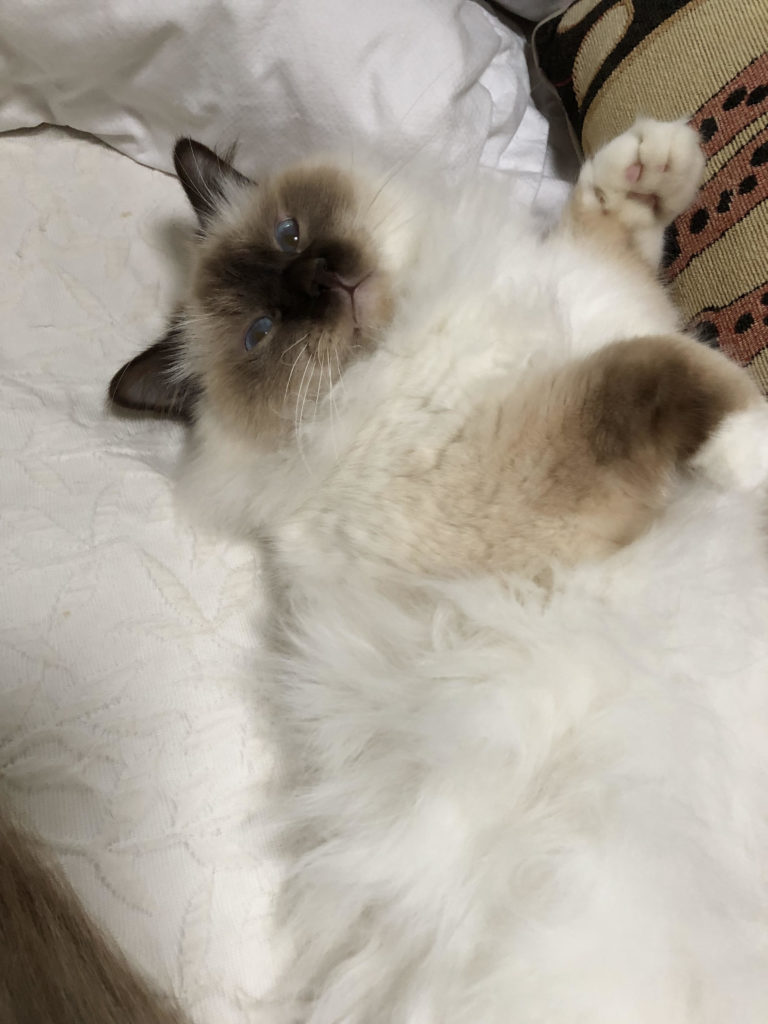
My apologies for ignoring the dog. One day he will get his own two thousand words.
Confessions of a Cat Custodian
When the cat pram arrived – a loud, bright-red affair complete with coffee-cup holder – I cringed. ‘The neighbours will think we’re crazy,’ I muttered as my then twenty-one-year-old daughter gleefully unpacked and assembled that outrageously indulgent pet accessory.
The pram topped other cat paraphernalia Francesca purchased over the years – a bumblebee suit, a hat in the shape of a shark’s fin, a mermaid tail, a pink lace dress. Miso – our indoor Birman cat – hated them all.
As I watched, I cursed those predatory online stores that enticed gullible people with cheap, colourful crap. I should have been a firmer parent, but now, it was too late. By this point, Francesca had a job and her own income. It occurred to me not only had I failed to educate my daughter about money management, I was enabling animal abuse.
‘He’s going to love it,’ Francesca cooed as she squeezed Miso into a harness that matched the colour of his eyes.
I sighed, knowing she wanted to show him off. Miso is a very good-looking cat. He has long silky white hair with chocolate-tips on his ears, legs, face and tail. He has white paws – as if he’s wearing ankle socks. Topping all this off, are eyes the iridescent, mystical blue of a distant galaxy. Birmans – the Sacred Cats of Burma – are thought to have originated in the temples of Burma and are accorded special treatment as they are believed to be reincarnations of Burmese priests.
While Miso does have an air of the divine about him, he can also look as if he is plotting to kill you. And there were times – like the pram debacle – when I didn’t blame him.
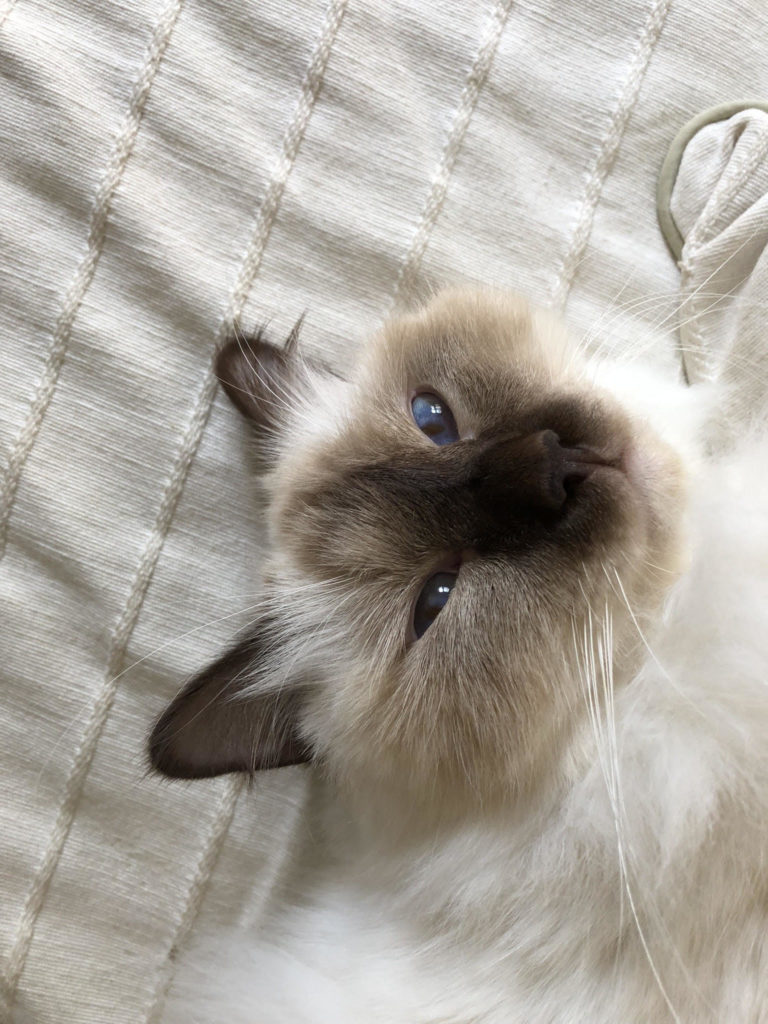
My eyes watered as Miso finally settled into that pram with the resigned air of one of those meditating Burmese priests. This was animal indulgence carried a step too far. Humanity – and my family in particular – had lost its grip on reality.
It turns out, however, when it comes to going loopy over our pets, the Japanese are masters. Pushing one’s pet around in a pram is de rigueur for Japanese urbanites, as is dressing them up in designer outfits, giving them expensive grooms and gourmet food. Considered family members, pets’ well-being is enshrined in a Japanese law which recognises the special status of any animal homed by humans. Thanks to beliefs that go back to folklore and Shintoism the Japanese believe animals (in particular companion animals) inhabit the same spiritual plane as humans.
As I watched Francesca depart with Miso like a handmaiden serving some god in his gleaming chariot (no way was I going with her – this was her personal crazy), I wondered: How had this happened? When did we transform pets into such overbred, luxury lifestyle accessories?
I grew up with semi-feral cats – unvaccinated, unneutered creatures – that mated rowdily and reproduced prolifically in our sprawling suburban garden. In our woodshed, I watched a cat give birth. This was before the feline parvovirus vaccine, when many kittens died of what we called back then ‘cat fever’. The cats that survived were tough, independent, flea-ridden, and snarky. My parents had an unspoken respect for our pets’ animal wildness. At a certain point, Mother Nature ran her course. When my father placed my favourite kitten Sylvia – erased too soon from the book of life by that virus – on a pyre of burning garden rubbish, I watched in frozen sorrow as she transmuted into smoke, flames and ashes. Pets were part of my induction into the unfathomable mysteries of the natural world.
With Australian laws now requiring owners to neuter and register our pets, over the years I have witnessed pet ownership metamorphose into something more akin to over-protective parenting. Along with a plea from the breeder to keep him indoors at all times, Miso arrived in our home with registration papers, a pedigree certificate listing parents with exotic, dreamy names and a detailed family tree that put Ancestry.com to shame. Having no say in his individual rights, he was also microchipped.
Thirty years ago, I would have regarded all this as absurd extravagance. Yet according to an Animal Medicines Australia study, last year, Australian households spent 13 billion on pet-related products and services. And somewhere in those figures are the costs of special scientifically-concocted foods for hairy indoor cats, catnip mice, tunnels, feather-duster toys and prams for cats like Miso.
An hour after Francesca set off to cruise our Sydney neighborhood with Miso, she returned, her eyes radiant. Passers-by stopped and swooned, she told me. They took photos to post on Instagram and Facebook. Our cat was now a local celebrity.
The Dysfunctional Cat
I confess, I had hoped Francesca’s outing would serve up a lukewarm dish of natural justice. Or result in a smite from Mother Nature’s cosmic light sabre. Perhaps Miso might express his disgust by scratching her with his syringe-sharp claws or defaecating in his pram. Instead, it was one of my reaping what you sow moments. I had, after all, started off this chocolate-tipped snowball-roll by owning an exotically handsome cat. In purchasing and incarcerating Miso, I had contributed to the whole inbreeding and anthropomorphism debacles animal welfare organisations like PETA and the RSPCA loathe.
This wasn’t even my first crime against feline nature. Once, I had been a prison-guard for cats that had never felt the wind’s breath tease their whiskers or munched on a blade of grass. When I lived in New York, I regularly cat-sat, looking after a variety of neurotic, cantankerous, calculating and dysfunctional cats who were as complex as their New York owners. In one apartment, I was given a water pistol and told to fire when the cat tried to wake me up at dawn by knocking over everything on the bedside table. The owners of a pathologically shy cat warned me that if I had visitors, the cat would vengefully defecate in the middle of the living room carpet while I slept. I did have visitors and, as promised, the cat deployed. All those cats lived indoors. Some – like their owners – regularly visited psychiatrists.
Warily, I watched Francesca unhitch Miso from the pram. Was he traumatised by this outing? Were we denying Miso the freedom to be his wild animal self? Had he enjoyed this outing or would we soon be paying a small fortune for a pet psychiatrist?
Miso, free from his restraints, strolled into a pool of sunlit carpet, stretched, and preened. ‘See? He’s happy,’ Francesca said. ‘He had a wonderful time.’
‘He’s relieved to be home,’ I snapped.
I would not be complicit in any form of animal abuse. I wanted to ensure Miso was happy going on these walks.
‘Next time, I want to go with you,’ I announced.
We set off the next day with our pet-on-wheels. Miso leaned forward, his front paw dangling from the pram as if he were a playboy in his convertible.
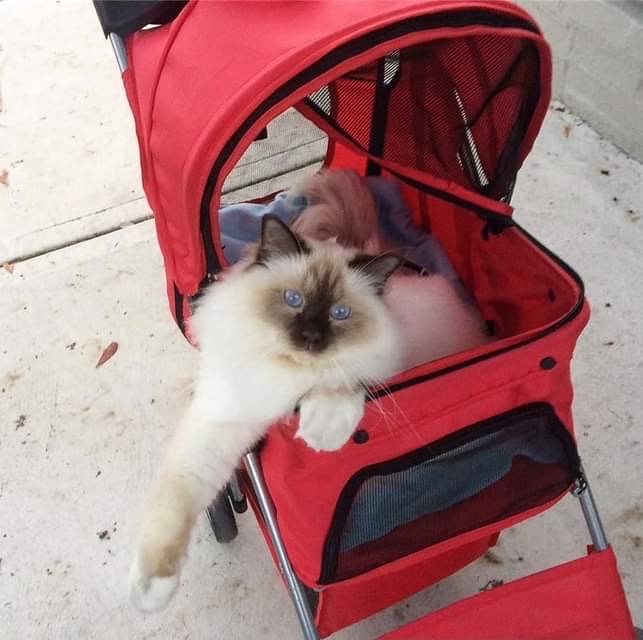
Reincarnated Burmese priest and wildlife killer.
It occurred to me all he needed to look completely cool was a pair of kitty sunglasses. I said nothing.
Half-way up the street, our neighbour Janet was trimming her front hedge. Janet detests cats. Wildlife killers, she calls them.
Janet’s gaze dropped to Miso in his pram.
My insides squirmed. ‘We’re crazy cat people,’ I explained.
Janet sneered. ‘If I see you at the shops with that…’ She pointed her clippers at cat and pram. ‘…I’m going to pretend I don’t know you.’
‘I’ll wave at you,’ I replied, avoiding her irradiating gaze.
I could almost hear her thoughts as we walked away. Oh, you shallow morons! Paying good money for a killer! Treating it like a baby! What are you? The cat’s slaves?
The Anthropomorphic Cat
My insides a maelstrom of defiant shame, I wondered if I was not only a bad parent, but a bad pet-parent. It occurred to me that while we raise our children to be independent, our pets remain dependent until the day they die. If humanity suddenly vanished, wildlife would return and thrive but pure-bred, incarcerated Miso wouldn’t even know how to nudge open the toilet lid to get a drink. Miso – who had only hunted the occasional cockroach or fly rendered sluggish by insecticide – would die of thirst and starve.
Amidst these inner flagellations, I kept my eye glued to Miso for signs of cat misery. I saw the treetops and sky reflected in his gemstone eyes. His nose twitched as the wind ruffled through his whiskers. His ears rotated towards the bird songs.
My thoughts see-sawed as we walked. At least, like those Japanese animal-loving Buddhists, we respected living things. At least we weren’t like the Ancient Egyptians who bred orange cats to sacrifice to Ra – their sun god. Humankind had moved on since those superstitiously ignorant times. My daughter, my cat and I were inhabitants of a more sophisticated, informed and scientifically savvy era.
Across the road, an elderly man gawped. Then again, was our cat a sacrifice to the gods of excessive consumption, gene-tinkering and ridiculous cat fashion?
was our cat a sacrifice to the gods of excessive consumption, gene-tinkering and ridiculous cat fashion?
The wind rippled through Miso’s fur. He looked radiant and dashing – the perfect picture for a kitty calendar.
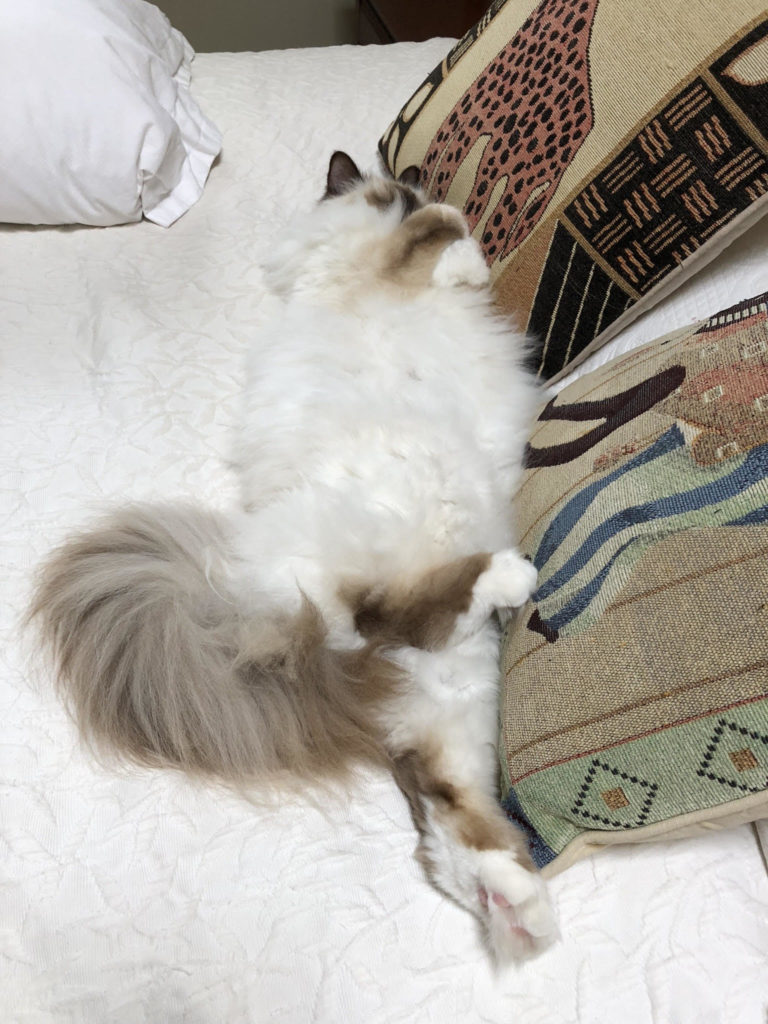
Wild or tame? Couldn’t Miso be both?
I decided then we were responsible custodians of a purpose-bred, superior cat. The Japanese – with their animal spirits – worshipped and respected their pets. Miso represented progress.
I took a deep breath and held my head high as we turned towards the main road.
A passing car tooted. Another car slowed. The driver stared, ignoring the pedestrian crossing ahead. In my mind’s eye, I saw a headline: Cat in Red Pram causes Fatal Traffic Accident.
The Paradox of Miso
By the time we arrived at our local square I was harbouring a new set of doubts. We were idiots. We were infantilising an animal whose wild ancestors once roamed the mountains, plains and forests. Plus, we were a threat to road safety.
A delighted squeal shattered my plummeting thoughts. A group of women ogled Miso.
‘Oooh! How cute!’
And so, it began. We chatted to doting strangers. A toddler sang Miso a song. A friendly dog inspected him. When a grim-looking couple – the woman in a wheelchair – saw Miso, their eyes lit up. Laughing, they gave him strokes and cuddles.
Through all this, Miso – our reincarnated Burmese priest – maintained an air of gracious and accepting calm.
Pondering the healing power of animals, re-setting my wobbling moral compass, we sat at an outdoor table at our local cafe.
When the food came, Miso eyed the bacon on my Eggs Benedict and the yoghurt on Francesca’s blueberry pancakes. In a moment of collapsed resistance, I gave him a sliver of bacon. Francesca took my cue and offered him some yoghurt.
Assailed by another stab of darkness, glimpsing this ridiculous scene from a distance, I considered how I had sunk another level down the anthropomorphism wellhole. At the very least, explosive cat diarrhea would be my punishment.
Just as swiftly, my qualms evaporated. Gazing into Miso’s fathomless galaxy eyes, past and future compressed into a singularity of spacetime. This child who had lost pets from car accidents, poisonings and infections was now a woman sitting with her own daughter at a café with a vaccinated, parasite-protected cat happily dining in a red pram. And, a year from now, Francesca – studying animal law and feeding the stray cats on her university campus – would volunteer at a Peruvian wildlife refuge on the edge of the Amazon rainforest.
In that Zen moment of calm, with rashers of bacon digesting in my stomach, I embraced the paradox of Miso.
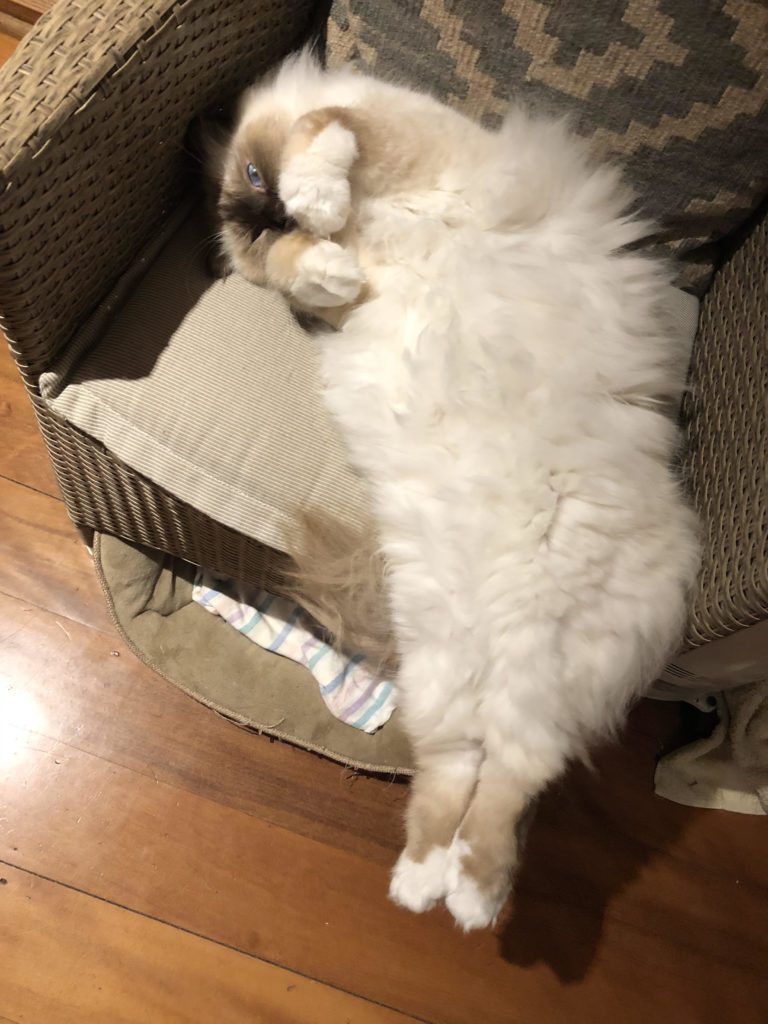
Looking at our harnessed, pram-bound pet contentedly licking yoghurt off his lips, I decided he was the luckiest cat in the world.
On our way home, Francesca took Miso out of his pram. After a stroll on his lead, after rolling in a patch of sunlight, he settled onto a seat under some frangipanis and star jasmine.
Paws crossed, his fur spread about him like a celestial robe, I saw the world’s secrets embroidered into his eyes.
He looked mysterious. Wise. Like Buddha under the Bodhi tree.
‘He’s having fun,’ I confessed.
After regarding me with a triumphant smile, Francesca photographed Miso and posted his portrait on Instagram.
